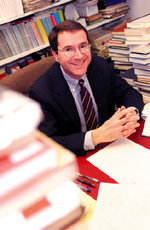David Galenson
— Poetic Values
Labor economist David Galenson,
in regulation jacket and tie, excitedly paraphrases a correspondence
between Robert Frost and T. S. Eliot. “Frost wrote
to Eliot, ‘Your problem is that you speak 23 languages
but you know nothing about the world.’ And Eliot’s
response was, ‘Your problem is that you’re stupid.’”
The poets’ exchange
reveals the dichotomy the economics professor has discovered
after five years of studying the creative process. In all
intellectual pursuits, Galenson posits, there are two models:
experimental and conceptual innovators, or seekers and finders.
Frost was a seeker; Eliot a finder—and no wonder they
couldn’t see eye to eye. The T. S. Eliots of the world
take giant leaps into the unknown, radicalizing their disciplines
and creating individual masterpieces. Yet they do their
best work at a young age, and it’s mostly downhill
from there. The Robert Frosts, meanwhile, are “kind
of fuzzy,” says Galenson, “going about their
work with trial and error.” They experiment, improving
with age.

Galenson, who’s spent
his career studying the productivity of immigrants, slaves,
and indentured servants, laid out this creativity framework
in his book Painting outside the Lines (Harvard,
2001). He determined the “value” of artists
(in this case, 20th-century painters) by the prices their
works fetched at public auctions and how frequently they
appeared in museum exhibitions and art-history texts. Then
he charted the artists’ ages when they created the
works with the highest values. Pablo Picasso’s early
works earned the highest prices, so he falls in with Eliot
as a finder. The values of Paul Cézanne’s late
works show he was a seeker like Frost.
 Galenson’s
analysis led the National Science Foundation to fund his
current study of the creative life cycles of Nobel economists
(among Chicago’s laureates Gary Becker, AM’53,
PhD’55, is a finder, Theodore Schultz a seeker). But
Galenson can’t pull himself away from the humanists:
his work on writers—digesting their letters and diaries
and tracking their works’ appearances in anthologies
and literary criticism—he does on the side, with the
help of a hired poet.
Galenson’s
analysis led the National Science Foundation to fund his
current study of the creative life cycles of Nobel economists
(among Chicago’s laureates Gary Becker, AM’53,
PhD’55, is a finder, Theodore Schultz a seeker). But
Galenson can’t pull himself away from the humanists:
his work on writers—digesting their letters and diaries
and tracking their works’ appearances in anthologies
and literary criticism—he does on the side, with the
help of a hired poet.
—S.A.S.
Select an expert:
Riccardo Levi-Setti - Trilobites
Richard Epstein - Parking
and Property
Mary Anne Case - Toilet
Inequities
Roman Weil - Vintage
Wine
Robert Grant - Sunken Submarines
David Galenson - Poetic
Values
John Milton - Poise
and Noise


![]() Advertising
Advertising
![]() About
the Magazine
About
the Magazine ![]() Alumni
Alumni
![]() UChicago
UChicago
![]()
![]() ©2003 The University
of Chicago® Magazine
©2003 The University
of Chicago® Magazine ![]() 5801 South Ellis Ave., Chicago, IL 60637
5801 South Ellis Ave., Chicago, IL 60637![]() fax: 773/702-0495
fax: 773/702-0495 ![]() uchicago-magazine@uchicago.edu
uchicago-magazine@uchicago.edu
 Galenson’s
analysis led the National Science Foundation to fund his
current study of the creative life cycles of Nobel economists
(among Chicago’s laureates Gary Becker, AM’53,
PhD’55, is a finder, Theodore Schultz a seeker). But
Galenson can’t pull himself away from the humanists:
his work on writers—digesting their letters and diaries
and tracking their works’ appearances in anthologies
and literary criticism—he does on the side, with the
help of a hired poet.
Galenson’s
analysis led the National Science Foundation to fund his
current study of the creative life cycles of Nobel economists
(among Chicago’s laureates Gary Becker, AM’53,
PhD’55, is a finder, Theodore Schultz a seeker). But
Galenson can’t pull himself away from the humanists:
his work on writers—digesting their letters and diaries
and tracking their works’ appearances in anthologies
and literary criticism—he does on the side, with the
help of a hired poet.